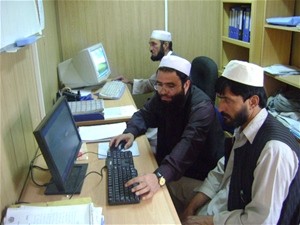
Employees of the Gardez Water Supply Department hard at work in their refurbished offices on new computers – both financed by a USAID project.
USAID/CAWSA
USAID program makes business more profitable for the city’s water supply department.
23 SEPTEMBER 2010 | GARDEZ, PAKTYA PROVINCE, AFGHANISTAN
Like many Afghans, Gul Marjan has been enthusiastic to tackle the challenges facing his country. As director of the city of Gardez Water Supply Department, Marjan and his 15 employees faced overwhelming issues, including a lack of financial resources, equipment, and office space. Moreover, the department could only cover about a third of its operating costs because too many customers were not paying their utility bills: Some customers had not paid their bills in 10 years.
USAID’s Commercialization of Afghanistan Water and Sanitation Activity (CAWSA) made the difference for Director Marjan and his team. The CAWSA program provided two specialists for Gardez to help Director Marjan prioritize the utility’s needs including obtaining office space, equipment, and supplies. Improving revenue collection was a more complicated problem to solve. The CAWSA program enabled Director Marjan and his administrative team to identify the causes of poor revenue collection using basic audit techniques.
A major factor hampering revenue collection was too few staff to address the collections backlog. CAWSA provided interns to work with the utility’s management and four additional interns to work with meter readers and collections staff.
CAWSA staff also worked with the utility’s finance department to identify and analyze all current and past-due accounts, identify “hidden” and illegal customers, prioritize collection of past-due accounts, and computerize all customer records and financial reports.
The additional staff and the new focus on setting goals and improving performance helped Director Marjan motivate his entire team to work more effectively and enthusiastically.
So far, the water utility’s collections team has collected more than $8,700 from its delinquent customers, significant money by Afghan standards. The utility is now able to cover 68 percent of its costs, an increase of more than a third. Their long-term goal is to cover 85 percent of all operating costs by 2013. Director Marjan is confident that his team will exceed that target.







Comment
Make a general inquiry or suggest an improvement.